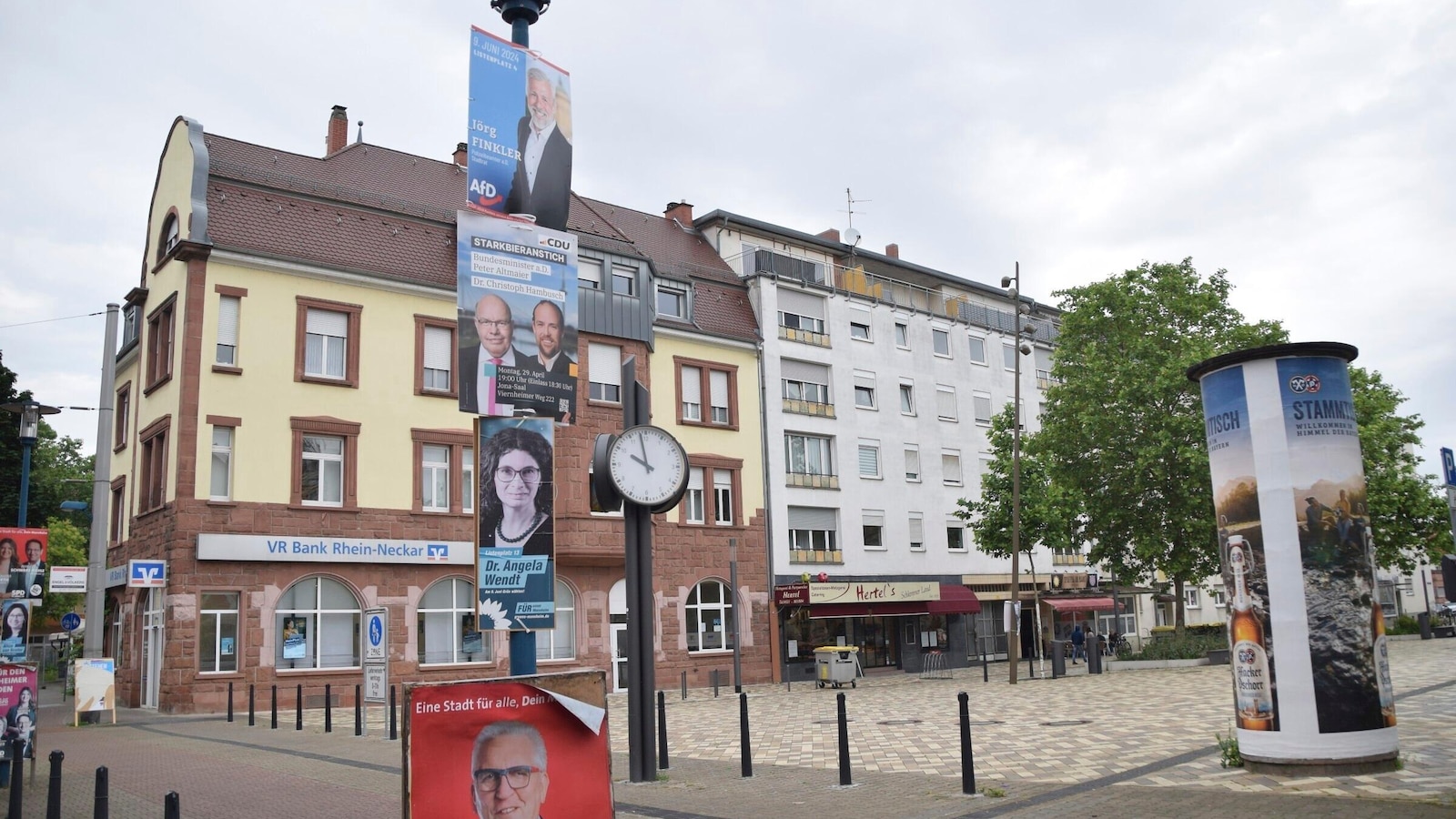
BERLIN — A member of a German far-right party was stabbed and wounded in the southwestern city of Mannheim, German news agency dpa reported Wednesday, only days after a knife attack killed one police officer and left five other people injured in the same city.
Dpa reported that a candidate with the far-right Alternative for Germany, or AfD, reportedly caught somebody trying to tear down an election poster on Tuesday evening. When he confronted that person, he was attacked with a boxcutter. Dpa reported that the candidate was still in a hospital with non-life-threatening cuts.
The candidate, who was campaigning for Sunday’s local elections in the state of Baden-Wuerttemberg, where Mannheim is located, was not identified. The attacker was detained, dpa reported.
The mayor of Mannheim sharply condemned the attack.
“This cowardly act is despicable and cannot be justified by anything,” Christian Specht said. “Anyone who attacks election candidates is calling into question our free, equal, universal, direct and secret elections — and therefore the basis of our democracy.”
“The hatred and willingness to use violence that is currently taking hold in our society is intolerable,” he added.
Mannheim police said Wednesday that the detained suspect, a 25-year-old man who was not further identified, was later taken to a psychiatric hospital.
“According to the current state of the investigation, there are no concrete indications that the suspect recognized during the attack that the injured person was an AfD politician,” investigators said Wednesday, according to dpa.
On Friday, a 25-year-old Afghan man stabbed several members of a group that describes itself as opposing “political Islam.”
The group, Pax Europa, describes itself as an organization that informs the public about the dangers posed by the “increasing spread and influence of political Islam.” Michael Stuerzenberger, an anti-Islamist activist who is one of the group’s leading figures and has spoken at its events, was among those wounded.
The attacker was still in the hospital.
Tuesday’s attack is the latest in a series on politicians in the country that has raised concern over rising political violence in Germany.
Last month, Franziska Giffey, Berlin’s top economic official, a former mayor and an ex-federal minister, was attacked at an event in a local library by a man who approached her from behind and hit her with a bag containing a hard device, police said.
A week before that, a candidate from the party of Chancellor Olaf Scholz was beaten up in the eastern city of Dresden while campaigning for this week’s election for the European Parliament and had to undergo surgery.
Both government and opposition parties say their members and supporters have faced a wave of physical and verbal attacks in recent months, and have called on police to step up protection for politicians and election rallies.
In February, the German Parliament said in a report there were a total of 2,790 attacks on elected representatives in 2023. Representatives of The Greens were disproportionally affected in 1,219 cases, those from AfD in 478 cases and representatives of the SPD in 420 cases.
The country’s vice chancellor, Robert Habeck, who is a member of The Greens, was prevented from disembarking a ferry for hours by a group of angry farmers in January, and the vice president of the German Parliament, Katrin Goering-Eckardt, also from The Greens, was prevented from leaving an event in the state of Brandenburg last week when an angry crowd blocked her car.
On January 7th, 2019, a shocking incident occurred in Germany when a far-right party member was stabbed in a targeted attack. The victim, Frank Magnitz, a member of the Alternative for Germany (AfD) party, was assaulted in the city of Bremen while he was leaving a New Year’s reception.
The attack on Magnitz has sparked outrage and condemnation from politicians across the political spectrum in Germany. The AfD party has been criticized for its controversial views on immigration and nationalism, but violence against any political figure is unacceptable in a democratic society.
The attack on Magnitz is a stark reminder of the growing tensions and polarization in German politics. The rise of far-right parties in Europe has been met with resistance and backlash from those who oppose their ideologies. However, resorting to violence is never the answer and only serves to further divide society.
The incident has also raised concerns about the safety of politicians in Germany. In recent years, there have been several attacks on politicians from various parties, including the stabbing of Cologne mayor Henriette Reker in 2015. Security measures for politicians have been increased in response to these incidents, but more needs to be done to ensure their safety.
The investigation into the attack on Frank Magnitz is ongoing, and authorities are working to identify and apprehend the perpetrator. It is crucial that those responsible for this violent act are brought to justice and held accountable for their actions.
In conclusion, the stabbing of a German far-right party member in a targeted attack is a troubling and concerning incident that highlights the need for unity and respect in political discourse. Violence has no place in a democratic society, and it is essential that all individuals, regardless of their political beliefs, are able to express their views without fear of harm.


